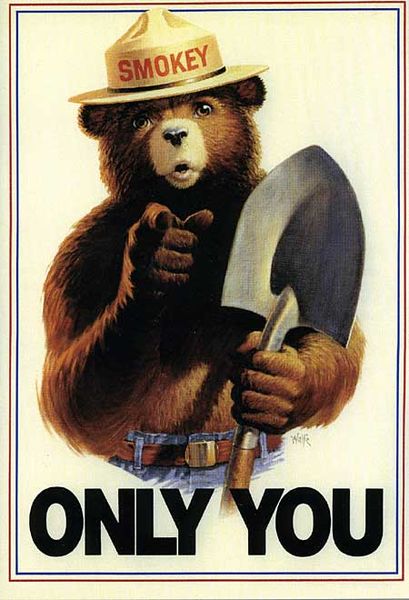Remember Smokey the Bear? “Only you can prevent forest fires.” As a boy, that was my mantra.
I grew up in the dry, grey sagebrush hills of Southern California—the site of some of the worst fires in US history. Smokey convinced millions of Americans that fire was the deadly enemy of all animal and vegetable life. It was a dangerous force that must be eliminated, or it would indiscriminately destroy everything it its path.
When I went on summer camping trips with my family, my favorite job was making sure the fire was out. Dad helped me put on his thick hiking boots, then i’d jump into the concrete fire ring and stamp on the smoldering embers until every glowing spark was extinguished. It felt great, like I was killing a diamondback rattler, making sure it could never spite it’s fiery venom at innocent pine trees, jack rabbits or, God forbid, baby Bambi. After Dad made sure that I had “assassinated” the fire, he’d say “good job” and I’d beam with pleasure.
Unfortunately, Smokey’s strategy hasn’t been a great idea in the long term. Scientists now realize that fire is an essential part of the forest’s eco system. Fires help eliminate dead trees and underbrush; certain seed pods germinate only after being exposed to the high temperatures of forest fires.
By preventing this natural fire cycle from occurring, dead trees and underbrush keep accumulating until the entire forest is a huge tinder box waiting to explode. Smokey’s strategy leads not to healthy forests and Nature in balance, but even larger and deadlier fires.
So the US Forestry Department has a new policy. Forest fires are no longer seen as bad or “evil”; trying to prevent all fires is not only impossible, but undesirable. Fire is now understood to be a natural part of a healthy forest system.
The equivalent of “fire” in business
What’s the equivalent of fire in business? What do most business leaders stomp down on, hard?
The fear of making a mistake.
Mistake-making and forest fires have a lot in common. Both seem to come out of nowhere. Both are unpredictable. And both fires and mistakes make leaders feel like they’re no longer in control.
Often fearful subordinates try to hide mistakes, problems or obstacles from bosses. The result—as with Smokey—can be bigger losses down the road.
Business consultant Steve Schlabs reports that, in big organizations, a salesforce is usually the group closet to the customer. Salespeople deal with the everyday concerns customers have with the product. Salespeople know what’s working with the product and what’s not. This is vital information to the leaders of a company.
However that information is often not delivered, or worse distorted, because sales people are afraid. They don’t want to be blamed for a problem in the product, or have their jobs threatened by their superiors because they “just can’t sell.” So small problems easily fixed go unchecked until a crisis happens. Mistrust between salespeople and their bosses can cause huge business disasters.
Here’s a better way
Develop a culture of curiosity. Look at patterns of behavior. Allow the people who are closest to the customer to speak openly, without feeling like they are jeopardizing their jobs. Instead of having a stomp-down culture, ask “Are all mistakes bad?” “Can failure lead to greater opportunity?” “Would learning more quickly about a product or interpersonal problem lead to a better outcome?”
Smokey’s bosses have changed their tune, and so can you. Imagine the bear in the hat: “Only You Can Inspire Curiosity and Challenge Old Thinking.”

